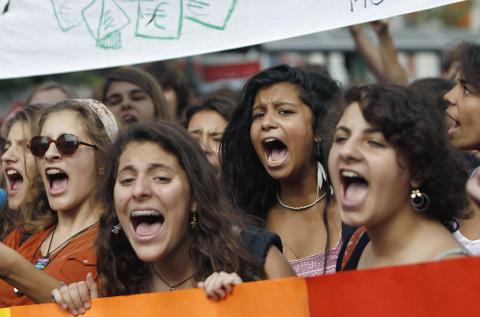Greece said its unemployment rate has topped 25 percent and its biggest company announced on Thursday that it would quit the country, in a fresh blow to an economy German experts have warned cannot be “saved” without writing off more debt.
The announcement by drinks bottler Coca Cola Hellenic (CCH) that it is switching its primary listing from Athens to London and moving its corporate base to stable, low-tax Switzerland is a bitter blow to the debt-crippled nation.
The firm, which bottles Coke and other drinks in 28 countries from Russia to Nigeria, is Greece’s biggest by market value and is 23 percent owned by Coca-Cola Co of the US. Its Greek operations, which account for 5 percent of its bottling business, will be unaffected, but the move was bad news for a nation struggling to compete inside the eurozone.

Photo: Reuters
CCH chief executive Dimitris Lois said the decision to switch the company’s primary listing to London and its corporate base to Switzerland made “clear business sense.”
It follows Greek dairy group FAGE’s relocation to Luxembourg this month.
“This is a healthy company that does not want to suffer from Greece’s high country risk,” said an analyst, who spoke on condition of anonymity.
CCH’s announcement coincided with data that showed Greek unemployment climbing for a 35th consecutive month in July to 25.1 percent from a revised 24.8 percent in June. The unemployment rate has more than tripled since the country’s five-year-old recession began.
Fifty-four percent of Greeks aged 15 to 24 are out of work, fueling violent protests against the tax hikes, spending cuts and public-sector job losses demanded by the EU and the IMF in exchange for more than 200 billion euros (US$258 billion) in loans since 2010.
Greece is still far off target.
IMF Managing Director Christine Lagarde, speaking in Tokyo, backed calls to give the country two more years to meet its budget deficit reduction targets.
Greek officials said such an extension would require an extra 11.5 billion to 12 billion euros in funding, and that even more money might be required because of slippage in the privatization process and the deeper-than-expected recession.
Without further aid, Athens says it will run out of money by the end of next month.
The sides are trying to strike a deal by next Thursday, when EU leaders are due to meet in Brussels.
“We are close to a deal,” said a finance ministry official, speaking on condition of anonymity, after a meeting between troika officials and Greek Finance Minister Yannis Stournaras.
The troika comprises the IMF, the EU’s executive commission and the European Central Bank.
“We hope to have a deal by the EU summit,” the official added, though it would still then have to be passed to parliament.

TAKING STOCK: A Taiwanese cookware firm in Vietnam urged customers to assess inventory or place orders early so shipments can reach the US while tariffs are paused Taiwanese businesses in Vietnam are exploring alternatives after the White House imposed a 46 percent import duty on Vietnamese goods, following US President Donald Trump’s announcement of “reciprocal” tariffs on the US’ trading partners. Lo Shih-liang (羅世良), chairman of Brico Industry Co (裕茂工業), a Taiwanese company that manufactures cast iron cookware and stove components in Vietnam, said that more than 40 percent of his business was tied to the US market, describing the constant US policy shifts as an emotional roller coaster. “I work during the day and stay up all night watching the news. I’ve been following US news until 3am

UNCERTAINTY: Innolux activated a stringent supply chain management mechanism, as it did during the COVID-19 pandemic, to ensure optimal inventory levels for customers Flat-panel display makers AUO Corp (友達) and Innolux Corp (群創) yesterday said that about 12 to 20 percent of their display business is at risk of potential US tariffs and that they would relocate production or shipment destinations to mitigate the levies’ effects. US tariffs would have a direct impact of US$200 million on AUO’s revenue, company chairman Paul Peng (彭雙浪) told reporters on the sidelines of the Touch Taiwan trade show in Taipei yesterday. That would make up about 12 percent of the company’s overall revenue. To cope with the tariff uncertainty, AUO plans to allocate its production to manufacturing facilities in

Six years ago, LVMH’s billionaire CEO Bernard Arnault and US President Donald Trump cut the blue ribbon on a factory in rural Texas that would make designer handbags for Louis Vuitton, one of the world’s best-known luxury brands. However, since the high-profile opening, the factory has faced a host of problems limiting production, 11 former Louis Vuitton employees said. The site has consistently ranked among the worst-performing for Louis Vuitton globally, “significantly” underperforming other facilities, said three former Louis Vuitton workers and a senior industry source, who cited internal rankings shared with staff. The plant’s problems — which have not

COLLABORATION: Given Taiwan’s key position in global supply chains, the US firm is discussing strategies with local partners and clients to deal with global uncertainties Advanced Micro Devices Inc (AMD) yesterday said it is meeting with local ecosystem partners, including Taiwan Semiconductor Manufacturing Co (TSMC, 台積電), to discuss strategies, including long-term manufacturing, to navigate uncertainties such as US tariffs, as Taiwan occupies an important position in global supply chains. AMD chief executive officer Lisa Su (蘇姿丰) told reporters that Taiwan is an important part of the chip designer’s ecosystem and she is discussing with partners and customers in Taiwan to forge strong collaborations on different areas during this critical period. AMD has just become the first artificial-intelligence (AI) server chip customer of TSMC to utilize its advanced